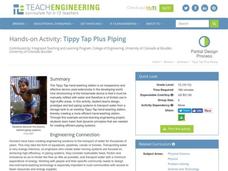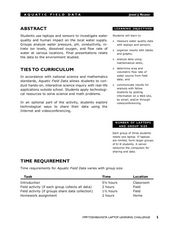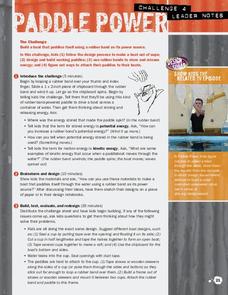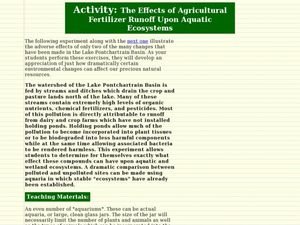Curated OER
Plant Transpiration
Students conduct various experiments to investigate plant transpiration. In this biology lesson, students explain how this process helps maintain the hydrologic cycle. They measure the rate of water loss in plants using a potometer.
Curated OER
Got Water?
Young scholars determine that delivering clean, fresh water to citizens around the world involves and affects politics, economics, international relations, and technology. They brainstorm a list of factors that might affect their town's...
Curated OER
Water World
Students explore the various steps of the water cycle. They identify the three steps in the water cycle and how they are related. Students describe three ways to conserve water. Students explore the origin of the water source that...
Teach Engineering
Tippy Tap Plus Piping
Getting water to a tap requires an understanding the fundamentals of fluid flow. Groups design, build, and test a piping system to get water from the source — a five gallon bucket — to a tippy tap. The objective is to be able to...
Curated OER
Water: P.O.V's Borders Picture Project
Through the use of digital cameras, this lesson shows students how to document how water is used in their local communities and explore how those uses impact the local environment.
Curated OER
How Much Water Does A Tree Transpire In A Day
Students engage in a lesson of investigating the amount of water that is transpired in a one day cycle. They conduct research to find the purpose of transpiration and find information to explain the value to a plant and explain how...
Curated OER
Rain, Rain, Go Away
Students conduct a number of experiments involving evaporation and condensation. They view and discuss a video about the water cycle and then design posters about the rain based on the book "Cloudy With A Chance of Meatballs".
Curated OER
Aquatic Field Data
Young scholars use laptops and sensors to measure water quality and graph their results. In this aquatics lesson plan students post their results to a website or email.
Curated OER
Chemistry In Plant Nutrition And Growth
Students investigate different factors that affect plant growth. They research the effects of water supply, radiant energy, air temperature, and soil temperature. Students also gather facts that influence plant nutrition that include the...
Curated OER
On the Surface
Students draw and label the 15 major rivers in Texas. They then draw and label another map with the major lakes and reservioirs of Texas. Students use the maps and locate and label the location of the following major Texas cities:...
PBS
Paddle Power
Potentially get all the way across the water. The fourth of five design challenges asks pupils to develop a plan for a paddle-powered boat that will store its energy. Given a limited number of supplies, the class members design, build,...
Curated OER
Water Water Everywhere and Not a Drop to Drink!
Middle schoolers describe limitations of fresh water resources on ships at sea. They realize the value of fresh water on the ocean and around the world. Students gain a knowledge of the process and economic cost of desalinization.
Calvin Crest Outdoor School
Survival
Equip young campers with important survival knowledge with a set of engaging lessons. Teammates work together to complete three outdoor activities, which include building a shelter, starting a campfire, and finding directions in the...
Curated OER
Our Country's Environment
In these environment worksheets, students complete several multiple choice questions that teach them about the Earth's landforms and water.
Curated OER
Scientific Method Experiment: Factors Affecting How Ice Melts
Students demonstrate the scientific method by conducting an ice cube melting experiment. They make predictions and observations, and conclude what factors make ice melt more slowly or quickly than normal.
K12 Reader
Competing for Resources
Young biologists examine the concept of scarce resources with a reading comprehension passage. After finishing the paragraphs, learners turn to the questions to demonstrate what they have learned about what is beneficial and what is...
Curated OER
Our Country's Environment
In this environment worksheet, students complete a crossword puzzle using the word bank and definitions for terms about the land and its water.
Curated OER
Circles in the Landscape: Irrigating Oklahoma Crops
How do you grow crops in a area with insufficient rainfall? Why you irrigate, of course. Class members investigate irrigation systems by designing a system of their own. After examining irrigation related concepts, vocabulary terms, and...
Curated OER
Mouthwatering Adjectives!
Third graders write descriptions of food items in order to create a restaurant menu. They use adjectives to describe mouth-watering and vivid food and compare it to a boring adjective-lacking menu. They design and share their menus with...
Curated OER
The Effects of Agricultural Fertilizer Runoff Upon Aquatic Ecosystems
Students measure the toxic levels of runoff and discuss the effects it would have on the aquatic system. In this runoff lesson plan, students answer questions to how runoff would affect the animals in an aquatic system.
Curated OER
Everyday vs. Extreme Relationships with Nature
Young scholars examine the interactions with nature and the environment. They discover where water comes from and ways to conserve water. They also examine energy sources and consumption.
Curated OER
All Aboard!
Students are placed in the position of the person who orders supplies for the ship. They calculate quantities required for a variety of items, and then to convert such quantities into dollars.
Curated OER
BACTERIAL GROWTH ON FOOD
Students address the question of the value of refrigeration in keeping food (chicken) from "spoiling". They experiment with aseptic technique skills in handling sterile water and some type of quoting system.
Curated OER
Our Food and Microorganisms
Pupils answer questions about how microorganisms can affect our food supply and how they can be controlled. The first set of inquiry activities are directed by the teacher. Subsequent activities are based on students generating their own...























